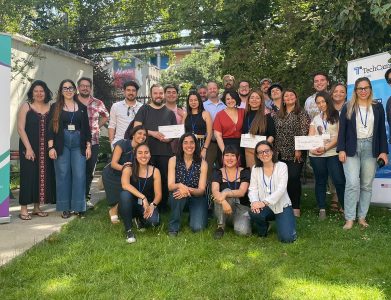TechCamp Chile, I was told, was an initiative that sought to fight disinformation through fake news and how this affected women working in politics. At first, I thought this was exceedingly complex and difficult to accomplish, especially considering we had only three days to mentor participants in the design of socially relevant projects.
Fundación Multitudes, in collaboration with the U.S. Embassy in Santiago and the TechCamp team, put together a strong agenda that aimed all four components strategically: disinformation, fake news, women’s issues, and politics.
While I was in charge of the gender component, i.e. women representation and gender socialization for both men and women, I participated in all the activities throughout the TechCamp. I perceived how participants became ever more committed as the program developed. We started off as individuals who hardly knew one another and ended up having fascinating conversations about the intricacies of political life and collective history in Chilean society.
The kick-off was a simple but effective mingling activity where mentors and participants had some time to explore the interests and perspectives of the group. And then the magic happened. Twenty people looking forward to learning from one another, to sharing and committing themselves to a common project. That is how intersectionality meets collective needs: there were mentors with specific areas of expertise – i.e.: press and media, politics and diplomacy, gender, project methodology – but, most importantly, there were engaged citizens who problematized their positions, assumptions and experiences.
At the conclusion of the three-day event, TechCamp Chile awarded funds to three executive projects that address the needs of different communities.
- With a social security reform in sight, agents from a community with a majority of elderly proposed an informative campaign where citizens could learn every detail of the new program compared to the previous one. They could also access up-to-date calculations of the eventual changes in their monthly income as the reform plan was modified by the government.
- After several electoral instances, workers from the office of electoral services in Chile (SERVEL) designed a handbook for other state and non-profit organizations to assess the impact of fake news and the extent to which intervention is required.
- Given the dangers posed by disinformation, a diverse group of professors, students, and members of local governments discussed their concerns and drafted a board game for teenagers and young adults to reflect on the reliability of sources and learn about fact checking.
While none of these projects directly addressed gender issues in Chile, I was happy to realize there was a gender perspective in all three designs. Participants were especially careful not to overlook the challenges faced by women in politics to whom fake news is often targeted. The very image of strong, decided, female leaders is subject to several forms of neglect and offense by the media. Thus, the three projects that TechCamp Chile promoted were gender-responsive in two ways: they portrayed and vindicated the role of women in politics and civic engagement, and they fostered participation and visibility of women in the social sphere.
For me, that’s a ten out of ten kind of experience.
You can read Martina’s Bio here.


